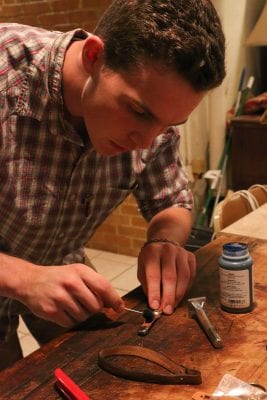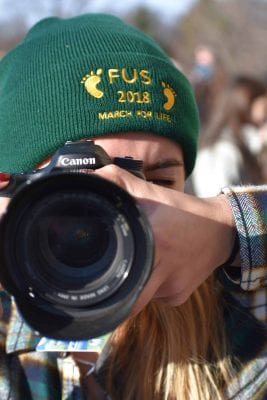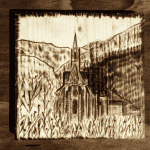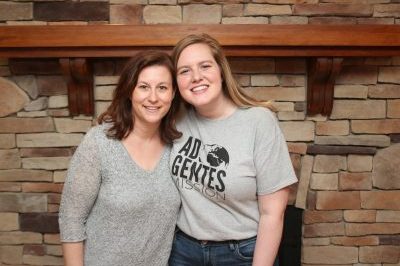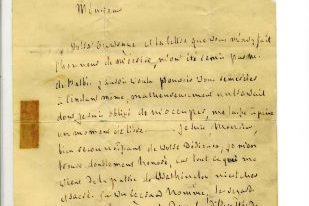The genesis story of Trinity Clothing Corporation starts with a restless night, an unused LLC, and a little nudging from God.
Before she arrived at Franciscan University in August 2017, Kendal Huntsman was a California teenager working three jobs in order to save up enough money for college. But, after a string of sleepless nights— “I tried everything to sleep,” she recalls—Huntsman realized God might be asking more of her than working as a ranch hand and office assistant.
“I remember looking up at the ceiling and asking: ‘God, are you trying to tell me something?’” says the sophomore. “‘Are you trying to get me to use my talents and my time during this gap year?’ And my brain just flooded with ideas that turned into the T-shirt designs and bracelets and crosses we sell.”
Her first step was to paint. An American flag in watercolor, with waving, bright stripes, the design would become the first in Trinity’s patriotic-themed line of clothing and apparel. With a little help from her mother, who 10 years before had bought the rights to an LLC under the name of “Trinity Clothing Corporation,” Huntsman set off to work building a small business from the ground up.
First came a website. Then a marketing plan. Then more products, inspired by designs she would hand paint and then transform into digital files that could be printed onto shirts. It wasn’t always easy: She had trouble finding suppliers with products made in the United States, and she had to overcome a fear of calling strangers to make inquiries about pricing and materials. Still, knowing Trinity was becoming just as much a “movement and mission” as it was a small business, Huntsman persisted.
In between working multiple jobs, moving across the country, and starting school at Franciscan as a marketing major, she completed the infrastructure for her apparel business; by the time she returned to Steubenville after Christmas Break in early 2018, Trinity was up and running, taking orders from across the country.
As Huntsman’s product lines grew, expanding from handmade paracord crosses and shirts to bracelets, phone cases, and other accessories, she realized Trinity might take some of the financial burden off paying for college. She also realized the business provided an opportunity to give back and start conversations about causes close to her heart.
“Every single thing we sell stands for something,” says Huntsman, who donates 10 percent of Trinity’s profits to charity. “Whether it’s supporting the firefighters or police officers or active service members, everything has a purpose behind it. It’s a way for people to support the values they love and to open conversations between strangers.”
Huntsman is unique, but not alone. By the time she’d finished her freshman year, she’d discovered she was part of a small community of Franciscan students getting a crash course in entrepreneurship, all while glorifying God in the process.
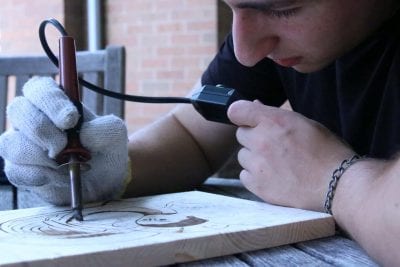
The Art of the Hashtag
Zachary Mercugliano returned home to Connecticut after his freshman year at Franciscan in need of a creative outlet. A pre-engineering major who’d just run the gauntlet of physics and math exams, he found an unlikely hobby in his brother’s pyrography set.
Even though he’d never worked with wood burning, he started experimenting with designs, creating a beautifully engraved decorative sign. Satisfied, he posted a picture of the final product to his personal Instagram account—and received a text message that launched a business.
“A friend asked if I took commissions,” he recalls. “I had just started wood burning, but I thought ‘sure, why not?’”
Mercugliano likes to note how Secret Fire Wood Burning, his custom pyrography engraving company, was “almost a mistake” if not for Providence and a little help from social media.
“It just started to branch out all summer long,” says the junior. “People would post pictures of a wood burning I had made and then contact me about doing an item. Eventually, it occurred to me to devote an entirely new social media account to the business and allow it to develop on its own.”
Both Mercugliano and Huntsman owe much of their initial business success to social media, in particular Instagram, which allows users to share photos and short videos with established “hashtags” that can be viewed by people across the world. According to Mercugliano, mastering the art of the hashtag—knowing which words and phrases generate increased user interaction and how that interaction can start a domino effect when shared by other users—allows small business newcomers to generate a lot of marketing buzz without a high level of investment in both money and time.
“There starts to be a branching effect when someone from the other side of the world likes a post,” he says. “It’s exciting that there are tools built into social media that allow you to provide a lot of public awareness of your product without heavy time commitments or exorbitant advertising costs.”
While social media has been key for Mercugliano in connecting with customers from around the world, not every Franciscan student entrepreneur embraces social media in the same way.
David Hahn began working with leather at St. Gregory the Great Academy in Elmhurst, Pennsylvania, as part of his school’s guild program.
“The whole point of the guild project was to encounter beauty on a personal level,” he says.
Beginning with simple gifts, such as engraved book covers, Hahn began sourcing and creating fine leather products for friends and family. While he was hesitant to turn his craft into a business, he eventually realized a basic level of compensation for his time and talent was reasonable.
“People want beautiful things, and as much as I’d love to make them for people for free, it’s just impractical,” says the philosophy major.
His leather goods business, which he named Stalwart Leather, has an Instagram page, but Hahn prefers word-of-mouth and personal communication to social
media when marketing his products.
“I try to keep it as personal as possible—I want to know the people I’m making products for and want to make sure they get what they want and that it’s right,” he says, explaining how he’ll often call or meet with his customers to go over the intricate details of the designs he carves into leather journals, handbags, belts, and other products.
Michael Williams, a sophomore finance major from Weatherford, Texas, also prefers alternative means of marketing to social media, although for different reasons than Hahn.
“We use social media but it’s not our main source of traffic,” says Williams, who co-owns Rustic Trail Crafts with his father and brother. “Most of our traffic and sales come from people searching for something on Etsy.”
Described as a “global marketplace” for a “community of sellers,” Etsy.com is an e-commerce platform that allows individual entrepreneurs to sell anything from clothing to self-published books to board games such as the ones sold by Rustic Trail Crafts. Modeled after the Chinese Checkers-style peg board games popular at Cracker Barrel restaurants, the games Michael and his father create don’t just come in a variety of designs and premium wood finishes, but also replace golf tees with spent bullet casings to give each game a rugged, men’s-interest aesthetic.
Williams admits he should “probably” use social media more to market his products, but for the time being, he and his father are pleased with their attempts to maximize referrals from Etsy’s search algorithm. And with more than $15,000 in sales in two years, they have good reason. Still, Michael is aware of the power of social media, especially as he’s seen how much it has helped Huntsman showcase her own products.
“Social media has really been a benefit to me,” says Huntsman. “There are tons of organizations and businesses out there that really have a heart to help one another, especially in the Christian community.”
More Than a Small Business
If their backgrounds, majors, and approach to business differ, then Franciscan’s small business owners share at least one element in common: a desire to see their operations through the lens of faith.
“You can do any job, but when God is the focus, it’s going to be different,” says sophomore Rosemary Stefanick, who, along with Huntsman, co-owns Sheepdogs and Sparrows, a Steubenville–based photography and videography business.
The daughter of popular Catholic speaker and author Chris Stefanick ’98, Rosemary met Huntsman through mutual friends during their freshman year at Franciscan. They bonded over their love of photography and horses, realizing that with a little creativity, a lot of practice, and a joyful attitude, they could take their hobby and make it into a burgeoning career.
“It started with us and our two cameras and tons of practice,” explains Stefanick. “This is a field where, if you don’t do it, you’re not going to get good at it. And the only way you’re going to get hired is if you’re good at the job.
“When you keep Christ in the center of what you’re doing, there’s a certain joy that comes with it that you don’t really find anywhere else,” the communication arts major says.
The joy Stefanick speaks about may at first sound cliché, but it’s rooted in the Church’s understanding of the nature of work. In fact, St. John Paul II’s encyclical on work, Laborem Exercens, speaks directly to the joy that arises when man attaches a salvific meaning to his labor, seeing it as part of God’s plan for the salvation of his soul and the souls of others. Working with wood, the same material Jesus used on earth as a carpenter, Mercugliano is well aware that his work goes beyond the symbolic.
“Any creativity inside of us comes from God as Creator,” says Mercugliano. “However, in our fallen state, we participate through subcreation, a process that begins in the mind, but is brought into physical reality through the work of our hands.
“In my mind’s eye, I can see the wood burning,” he continues. “I know what it will have to look like in the end. But it takes a physical effort, cutting and shaping the wood with heat, in order to transform a piece of wood into a work of art.”
For Hahn, the craftsmanship required to create leather goods doesn’t just tap into the salvific meaning of work, but also the goodness and beauty of creation.
“I really believe that my work is a prayer,” says Hahn. “The beautiful in and of itself is an evangelization tool: Beauty and goodness themselves are natural ways we are drawn to God, who is beauty and goodness himself.”
Hahn admits Stalwart Leather isn’t likely to lead to a career, but for students like Williams, who spent his summer interning for billionaire Bass family corporation Sid Richardson Carbon and Energy, the opportunity to develop a small business reinforces both what he’s learning in class and through his internships—all while providing a foray into what is likely the first of many business ventures.
“I’m in business because I want to be,” says Williams, who created a marketing plan for Rustic Trail Crafts as part of his freshman marketing class at Franciscan. “It’s fun; I enjoy business, and that’s where I see myself headed.”
“The knowledge and experience have been worth more than the money we’ve made from it,” he adds—no small statement given Rustic Trail Craft’s $7,000 in profit.
Huntsman, too, has designs to continue in business as a career path. And while the seed of entrepreneurship was planted before she started college, she’s grateful for the continued inspiration she’s found at Franciscan.
“Franciscan has been such a blessing,” she says. “There’s just so much talent here, and it’s been awesome to discover there are students like me who have a passion to use their talents to make products or offer services that will make the world a better place.”
